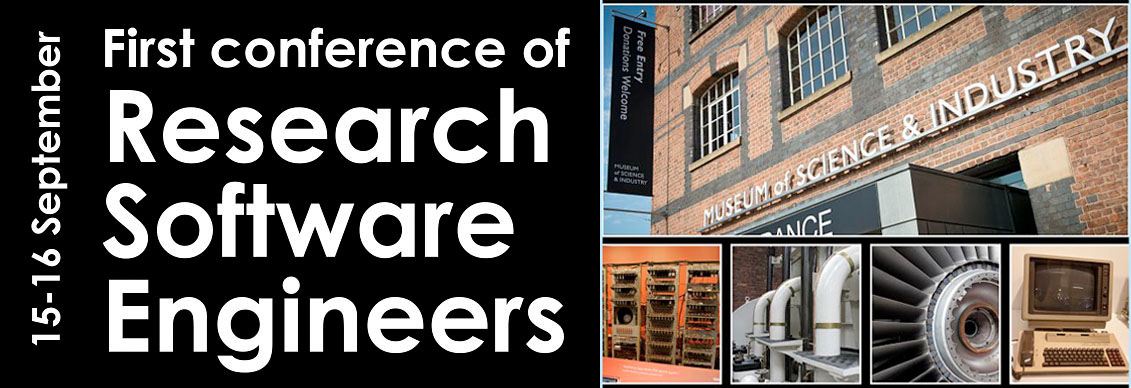
This conference would not be possible without the support that the EPSRC provides via the RSE-Network, which we gratefully acknowledge.
This is the first conference of Research Software Engineers. It’s a community conference so we want to keep cost of registration as low as possible and, where possible, support the attendance of RSEs who do not have access to funds for conferences. We’re expecting around 150 RSEs, from all backgrounds and disciplines, to attend this first conference.
Research Software Engineers are the people who write the software used in research and make the technical decisions about which technology is used in research projects. This is the only event where this community will congregate to learn about the new tools and technologies that could be used in their work.
We have a number of different sponsorship packages available. We’re also flexible! If you have a different package in mind, please let us know.
Gold sponsor
We are pleased to announce Microsoft Research as the Gold sponsor of the RSE Conference! Microsoft Research have supported the RSE Community since its early beginnings so we are happy to have gained their support for the first RSE Conference.
Microsoft Research have contributed to nearly every product Microsoft has shipped, including Kinect for Xbox, Cortana, cool free photography apps like Hyperlapse, and other programs that help secure your data in the cloud. We have world-renowned scientists at the forefront of machine learning, computer vision, speech, and artificial intelligence. Our external collaborations include efforts to prevent disease outbreaks and solve problems facing large cities such as traffic and pollution.
We welcome Matthew Johnson, who leads the Agile Projects Team at Microsoft Research Cambridge (UK), who will provide the keynote address.
Silver sponsors
We are pleased to announce Intel as our silver sponsor. Through computing innovation, Intel pushes the boundaries of smart and connected technology to make amazing experiences possible for every person on Earth. From powering the latest devices and the cloud you depend on, to driving policy, diversity, sustainability, and education.
Bronze sponsors
We can now announce the following Bronze sponsors!
The Scientific Computing Department (SCD) at STFC develops and utilises its expertise and relationships to establish leadership positions on the provision and support of scientific computing infrastructures and the research and development of scientific applications. This increases the UK’s scientific and economic impact by the creation of innovative solutions. SCD provides the computing, data storage, networking infrastructure and applications required by today’s advanced science facilities to support the complete scientific life cycle, from background research, through simulation and experimental design, data collection and analysis to publication.
Research IT at the University of Manchester provides specialised eResearch capabilities, helping you to realise your aspirations and support you in conducting world leading, high impact research. We will work with you to eliminate barriers, increase your productivity and continuously expand what’s possible. We provide access to powerful technology platforms and advanced skills encompassing high performance computing, software and data engineering, data visualisation and analytics and research data storage. Our strong governance, support and training complement these technological capabilities and allow you to focus on your research, rather than managing technology.
The Software Sustainability Institute cultivates better, more sustainable, research software to enable world-class research. We help people build better software, and we work with researchers, developers, funders and infrastructure providers to identify key issues and best practice in scientific software.
CANARIE designs and delivers digital infrastructure, and drives its adoption for Canada’s research, education and innovation communities. CANARIE keeps Canada at the forefront of digital research and innovation, fundamental to a vibrant digital economy.
Other options
CCPBioSim has kindly provided sponsorship for two of the poster prizes. CCPBioSim (Collaborative Computational Project for Biomolecular Simulation) is an inclusive and wide ranging project, bringing together chemists, physicist and chemical engineers as well as researchers from all branches of “molecule-oriented” biochemistry and biology. Our aim is to involve experimentalists and computational specialists, sharing the belief that the best science can be done when theory and experiment are closely integrated. CCPBioSim engages with early career researchers and the non expert through the provision of tutorials and workshops enabling them to become proficient and productive users of biomolecular simulation techniques. We are also actively engaged in developing new advanced methods, which in future will be used by our community to deliver new and exciting science.
CCP5 has kindly provided sponsorship for two of the poster prizes. CCP5 is the Collaborative Computational Project for computer simulation of condensed phase materials at length scales spanning from atomistic to mesoscopic levels. Materials of interest are such as liquids, polymers, solids, surface materials and macromolecules. CCP5 is a very active research community funded predominantly by the Engineering and Physical Sciences Research Council (EPSRC) of Great Britain. It was founded more than 30 years ago to promote the involvement of UK scientists in collaborative research in this area. The idea is to harness a variety of expertises among the Community Members and to foster collaborations in a friendly and cooperative environment so as to carry out world-class researches effectively, both in terms of costs and efforts. The UK has a large and successful research community engaged this area of work. CCP5 plays a key role in achieving communication across this large community. The Project has a high international profile: approximately 75 % of the large membership (currently around 1200 members) is from overseas.